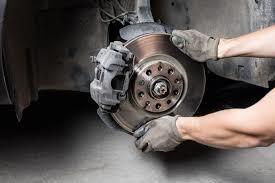Brake & Suspension

Brakes
Loss of Hydraulic Pressure: The brake system uses hydraulic pressure to push the brake pads against the rotors. If there is a leak in the hydraulic system the brakes will not provide the correct stopping power.
Worn Brake Pads: Brake: Brake pads will wear out over time. The have a indictor that will make contact with the rotor and produce a squealing noise when they get too thin. If the brakes are squealing the pads should be replaced. If the squealing turns into a grinding noise, the pads have worn through completely, this can damage the rotors which is a much more expensive repair.
Stuck Caliper: The calipers push the brake pads against the rotors. If a caliper gets stuck the vehicle will pull to one side. A failing brake hose can cause this issue.
Warped Rotors: If the rotors are exposed to stress, such as towing or mountain driving, they can warp. Warped rotors will cause the vehicle to vibrate and shake while braking.
Worn Brake Shoes: This is basically the drum brake version of worn brake pads for disc brakes. The shoes will squeal when they are too thin and need to be replaced. A grinding noise indicates shoes that have been worn through completely.
Suspension
Worn Shocks or Struts: In most vehicles the struts will eventually wear out and need to be replaced. If you notice excessive bouncing when going over bumps, or the vehicle nosedives when braking, it may be time to replace the shocks or struts.
Uneven Tire Wear: A failing suspension system can lead to uneven tire wear as the system is not holding the wheels even on the road at the proper angle. Look for bald spots on your tires. Suspension problems should be inspected and repaired as soon as possible.
Bad Spring Coils: In most cases, spring coils will last the life of the car but they can break. If the vehicle is not driving smoothly or leaning heavily to one side, it could be an issue with the spring coils. This should be fixed immediately.
Leaking Shocks: Shocks will often have to be replaced over the life of a car. If there is oil leaking on the garage floor or a leak is visible from the shocks, it is time to get them replaced.
Steering
Bad Tie Rods: Tie rods are the component that connects the steering linkage to the wheels of a vehicle. Eventually tie rods will wear out. As they do the vehicle will go out of alignment and wear the tires faster. There may also be a squeaky sound and the steering wheel may be harder to turn.
Loose Lug Nuts: Something as simple as a loose lug nut will cause the steering wheel to shake. This is a fairly easy problem to fix.
Unbalanced Wheels: This problem can also cause the steering wheel to shake at certain speeds. At higher speeds this can become dangerous. The tires should balanced as soon as possible.
Steering Gearbox Not Responding or Hard to Steer: if the steering wheel does not seem to be responding properly or it is hard to steer this can indicate a problem with the steering gearbox. This issue can quickly become dangerous. The steering system should be inspected and repaired as soon as possible.
Power Steering Malfunction: The power steering component can malfunction for a number of reasons. Fluid may be leaking due to damaged seals on the power steering pump, or there could be a leak in one of the power steering hoses. A whirring or siren-like sound coming from the steering pump can be an indicator of this problem.
Power Steering Pump: A failing power steering pump can make the steering wheel hard to turn and it may make a groaning noise when the wheel is turned. A failing pump will eventually die and need to be replaced.
